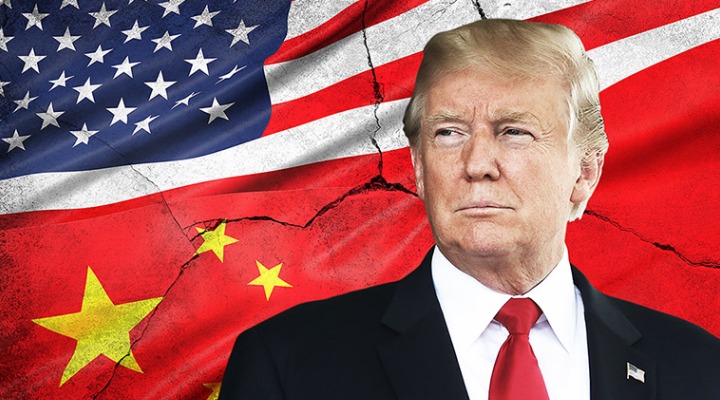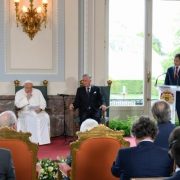
The trade war started on July 6 between the United States and China could escalate as it is not just about commerce. The United States is very unhappy about its trade deficit with Beijing, hovering according to its own estimates at about $500 billion, but this is just the tip of the iceberg.
A short history
The long-term reason for this trade deficit is twofold. In the late 1970s, China was granted very low import tariffs for its exports to America, and the United States encouraged exports of technology to China. The combination of these two elements created the conditions for Chinese development in the following decades.
As the price for this, China was supposed to become an ally of America in Asia. Actually, because of these conditions, which were more favorable than for any other country in Asia, China was singled out to be America’s best friend in the region.
These special conditions were further improved in the late 1990s, some 20 years later, when China was accepted into the World Trade Organization (WTO). China’s entry into the WTO further expanded China’s access to the global markets and the absorption of foreign technology to improve Chinese industry. An unspoken condition of this entry was that China had to become democratic.
Furthermore, in the first years of renewed China-US relations, China was useful to America against the USSR. Since the early 1990s, China was also helpful to America for the expansion of its new economic and trade vision, called globalization.
However, 40 years after the beginning of the Chinese reforms, and almost 50 years after Nixon’s trip to China, the conditions are all very different.
China has not turned out to be an American ally, China has not become a democracy, and China is no longer useful against the USSR, which in the meantime has fallen apart. China is also no longer necessary in the American-led program of globalization ‒ in fact, it turned out to be almost an impediment to many American commercial and economic gains.
All of this is completely changing the situation around China, and it is leading the United States to radically change its approach to China.
Demands and Concerns
Therefore the trade war can be just the beginning. In fact, as leaked by some media[1], the United States wants not only to cut China’s trade surplus with America, but also greater access to China’s domestic market, which in the meantime has become potentially the world’s biggest market.
America also wants China to stop its program to become a technological and industrial powerhouse by 2025, as it sees it as a challenge, not only to its power but also to its welfare. Moreover, the US wants China to withdraw from the South China Sea, the passageway of some 40% of all global trade and a potential stranglehold on commerce to Japan, Korea, and to some extent California.
Besides America’s concerns, there are objective worries of many countries including the EU. China’s opaque, non-transparent political and economic system creates unfair economic competition with countries that are more transparent.
China can decide overnight to buy or sell any given good without any transparent process of political decision making, but this process will impact prices worldwide and force every other country to pay for or benefit from Chinese decisions.
Of course, United States and the EU, because of the size of their economies, have similar powers, but market and political decisions in Washington or Brussels are very open. Therefore anybody can prepare for these decisions and also influence the process by writing, lobbying, and producing arguments in favor of or against any given choice.
The Chinese political and economic system makes all this impossible ‒ if not the crime of “interfering with China’s internal issues”. Therefore, China is creating an objective condition that changes the present, established economic and political order. This challenge has been framed in terms of an authoritarian system against America’s democratic system[2], which is more understandable for the broad public and reminds us this is some kind of Cold War II unfolding.[3]
However, this is different from the old challenge of the USSR. Then Moscow sought to spread its ideology and its political system worldwide, and therefore it was locked in a life-or-death fight against the capitalist system. However, that was a choice, a belief in a certain system, communism, that should and would triumph worldwide and bring a better life to everybody. China, differently, is objectively forcing changes in the political and economic system without an intention to do so. But in many ways the result is the same.
Actually the result could be more dangerous than with the USSR. The success of the Chinese system in China pushes everybody to objectively reconsider some of the economic policies in the West, and encourages a concentration of power in other countries.
That is, if China has managed to achieve its success by consolidating power, then other countries might want to follow the Chinese path and concentrate power too. But this will ultimately break down the global economic and political system that has emerged not only since the end of the Cold War but also since the rise of capitalism in England in the 19th century.
On top of this ideological challenge, there are geopolitical threats as well. Countries like Japan, Vietnam, Indonesia, and India may want to side with the old, known, weaker “hegemony” of the United States against the new, unknown, stronger “hegemony” of China.
Therefore, China, consciously or unconsciously, has put itself at the center of a gigantic tangle that challenges the world order and the politics and economics that have created the present market and political system since the birth of capitalism.
On top of that, China has also re-launched a Silk Road policy. The Belt and Road Initiative (BIR, China’s Silk Road policy) de facto marginalizes the maritime routes that go through the American continent and have been centered around the American continent since the discovery America by Columbus in 1492 ‒ itself an attempt to get around the Turkish hold of the Mediterranean after the conquest of Constantinople in 1453.
Does China realize what it has done? The USSR was fully conscious of the threat it presented to the capitalist world. It was actively aggressive in this sense: it wanted to topple the capitalist system and establish a communist utopia worldwide. China has no such clear program. Looking at official documents and talking to officials for several decades, it seems rather that China was simply oblivious to America’s role and support in its development, and similarly, it was oblivious to the price America expected China to pay, becoming an ally and a democracy ‒ and today it doesn’t realize the objective challenge that the size and structure of its economic and political system poses to the whole world.
America, on the contrary, seems fully aware of the risks brought by China, and although there seems to be no clear strategy on how to cope with this gigantic new situation, Washington does want to solve this issue and it cannot stand to carry on like it did in the past. Besides, behind America there is a large number of countries that would rather side with America and not with China.
China’s Challenges
This poses the greatest challenge to China since the Opium Wars in the 1840s. China needs a massive rethinking of its position in the world and not only with America. It is not about trade, it’s not about American demands for technology and industrial developments, and it’s not about a Thucydides’ trap[4] ‒ that is, the risk of a clash between an incumbent and a rising power. It is a political, economic, and geopolitical change brought by China to what the European-led world has done since the discovery of America and the birth of capitalism in England at the beginning of the 19th century.
This sets up a series of issues for China and for the rest of the world. The rest of the world, as Michael Pillsbury[5] and David Goldman[6] have suggested, means that the United States, but also European countries, and all countries have to undertake to face China’s objective challenges.
The US needs long-term projects to boost education, infrastructure building, and investment in science and technological research. Perhaps similar to what happened to the capitalist world in the 1960s and 1970s, facing the Soviet challenges, capitalist developed countries have to learn from the Chinese knack for structure and long-term planning. Politics in the West is often mired in short-term gains aimed at winning the next election, the next debate on TV, the next opinion poll ‒ that is, politics has been hijacked and held hostage to some short-term, shallow journalism, dictating the agenda for tomorrow but completely forgetting the goals for 10 or 20 years out.
The West has to learn to have comprehensive long-term programs, able to cope with long-term aims and threats. In the 1950s and 1960s, capitalist countries learned that taking care of the needy and implementing social policies that would help the poor would create better conditions for social turnover, and would actually undercut the allure and fascination with the communist utopia.
That is, capitalism could take care of social needs and have freedom at the same time; therefore it was automatically better performing than a communist system. In the same fashion, now Western countries have got a lot to learn from China, in terms of long-term planning and ability to adapt the long-term planning according to daily needs.
At the same time, China is in for even more massive reforms than the ones expected in the West. If China keeps on having a nontransparent political and economic system, because of its size and therefore the size of its daily needs and procurement, this will lead to a clash with many countries. In this clash, it may win or it may lose, but the clash will happen, and this objectively could stop China right in its tracks and reverse the gains acquired in past 40 years.
If China wants to avoid the clash, it has to undertake great changes. It has to liberalize its political system and its economy.
Outline of Chinese reforms
How to achieve this, and what could be a feasible political and economic liberalization for China, is of course open to debate.
Internally, in the past five years, President Xi Jinping has concentrated power in a fashion similar to Mao Zedong. However, this concentration of power was also the main reason for the failure of the Great Leap Forward in the late 1950s and the Cultural Revolution in the 1960s and 1970s. Now, Xi Jinping faces challenges different from those of Mao, but the risk of a massive clash could bring down China, with an even steeper fall than in Mao’s time.
At the time of the Opium Wars, China’s economy was by far the largest in the world; it had 70% of all silver in the world, which was tantamount to foreign reserves today; and its GDP was about one-third to half of the global GDP. China’s GDP is presently about 15% of the global GDP, much smaller than Manchu China; and its foreign reserves, which stand at over US $3 trillion, are a fraction of all the money circulating in the world.
During the Opium Wars, China lost and this defeat led to massive upheavals in the empire and to the ultimate demise of the Manchu dynasty. In theory now things could have even bigger consequences, as China was then partially isolated from the global economy. Now Beijing, with 40% of its GDP in import-export, is much more dependent on global trade and goodwill.
What to do about China, then? Briefly, here we dare to suggest a couple of bullet points that could help China wade through this difficult moment without even touching some of the US demands.
- China needs to create a better and more open environment for its own businessmen. All Chinese entrepreneurs are guilty of what is called the “original sin,” i.e. all have committed some economic crimes. This is part of China’s primitive accumulation, as Marx would put it. It is part of the transition from a socialist to capitalist economy. The country has to draw a line and make entrepreneurs feel safe that they will not be prosecuted for past crimes[7]. Without this new social pact, not only will Chinese entrepreneurs feel constantly unsafe in the internal Chinese market, but foreign entrepreneurs will similarly feel insecure, and China’s economy will depend on the latest political decision by the latest political leader, which can change overnight as happened many times in the past. This kind of amnesty would be the foundation necessary to build a healthier, legal internal market for both Chinese and foreign enterprises willing to do business in China and with China.
- Then there is the political system. Some think that the Communist Party is the root of evil in China, and to return to a better environment, one has to abolish and upstage the Communist Party. However, with 90 million members, the party is a sprawling entity reaching everywhere in the country, with a web of relations and clout that goes far beyond anything experienced during imperial times in China. Then a puny 100,000 mandarins would sit over 300–400 million people. It is also different from the USSR, where in the 1930s, at the rise of Stalin’s dictatorship, party members were only 1/3 of all government officials. In China, government officials are practically all party members. Moreover, there are perhaps some 3 million government officials, 1/30 of all party members. Trying to remove the party would not just be impossible, it would be useless. Under a different name, with different garb, the party would continue to exist well beyond its formal demise, similar to, and possibly much worse than, what happened with the imperial government system that survived the end of the dynasty. It will be therefore necessary to work with the party in changing the way it rules China and make it more in line with the rules of the world.
Xi Jinping is now paramount leader, possibly for life. Therefore he could be elevated to a position of top guarantor of the political and economic system, and below him, he could preside over a gradual liberalization of politics in the party. For instance, the party could select two candidates for premiership, and open countrywide elections could be held between these two candidates. A conference on drafting a new constitution could be called and a board of even foreign dignitaries could be assembled to help draft a new constitution to be more in line with the needs of the world.
Hopes for Change
Can China do that? Unlike the Soviet Union, China has no ideological belief in the virtue of communism. The Chinese leaders are committed to making China great and wealthy ‒ therefore, in theory, this is not in contradiction with making the world overall greater and wealthier. Those changes could and would put the national interest of China in line with the international interest of the world as a whole.
Therefore, in theory, the Chinese leader could embrace these changes. Their main concerns could actually be the stability of the system, and trust in having a liberal society after the failures of liberal society in the world presently, where the liberal approach is under attack in many countries from waves of populists and neo-authoritarians.
China has a point in being wary of instability internally. However, by keeping the party in place and granting a political continuity, these risks could be dampened. Of course these are risks anyway, but they are much smaller than the risk of a major conflict with the United States and the world.
As for the problems of liberal societies, perhaps there is some misunderstanding in China. Liberal societies live in a state of constant superficial havoc. However, this constant instability doesn’t touch a deeper stability of their institutions. China, on the contrary, lives in a state of peace on the surface with violent and bitter in-fights and struggles underneath. China is in other words an animal with an external skeleton, like a shrimp or a lobster. The hard external shell holds in the meat. However, if the external shell is pierced and cracked, the animal is immediately defenseless.
Liberal societies have an external soft skin but with strong internal muscles and bones. They are more sensitive to any foreign variation of weather, attacks, or insults, and thus they are prone to rashes, bruises, and small wounds. However, because the bones are internal, major fractures are more difficult.
Therefore, when China sees the rise of divisive policies in many countries over immigration and the push for more authoritarian leaders, it may be prone to think that these will bring about the demise of the Western countries.
Stalin committed the same mistake when he saw the 1929 financial crash just as he had embarked on the failing policy of collectivization of private land in Russia. His collectivization was a disaster, but he thought the 1929 crash was an even bigger disaster, and capitalism would soon crumble down while his USSR would be ready to collect the pieces. In fact only the rise of Nazi Germany and its aggressive war saved Stalin and his Soviets from certain demise in the following years. Is China in a similar situation?
Reforms should help China to move from an external to internal skeleton, which is stronger. But this implies a radical change in the way the country is run. These changes could and should happen in line with making China an ally of the United States and more democratic.
Unfortunately, there is not much time for all of this. The United States and many other countries are tired of waiting for China and for the timing of its reforms. Therefore, we are facing a dramatic moment. Either China manages to begin the changes quite rapidly in the next couple of years ‒ or even in the next few months ‒ or the clash could grow bigger and more dangerous.
[1] See for instance https://www.bloomberg.com/news/articles/2018-05-04/here-s-what-u-s-demanded-of-china-at-the-start-of-trade-talks
[2] See for instance the talk of Secretary of Defense James Mattis https://www.defense.gov/News/Article/Article/1516408/national-defense-strategy-to-restore-competitive-edge-mattis-tells-senate/
[3] See also http://www.settimananews.it/italia-europa-mondo/three-waves-of-recent-us-china-history-leading-to-present-clash/ and http://www.settimananews.it/italia-europa-mondo/utilitarianism-democracy-and-moderating-role-for-the-holy-see/
[4] See Graham Allison, Destined for War: Can America and China Escape Thucydides’s Trap?, 2017.
[5] The Hundred-Year Marathon: China’s Secret Strategy to Replace America as the Global Superpower, 2016.
[6] See for instance David Goldman http://www.atimes.com/article/a-tragedy-in-the-making-as-the-us-confronts-china/
[7] We saw this point two years ago. See http://www.atimes.com/latest-china-stock-crash-spotlights-urgent-need-for-financial-reform-sisci/






I think that change can only come from within and any attempts to try it from outside will be violently refuted.
In addition its highly patronising to expect China to change to the expectations of the rest of the “liberal” world.
It will change to whatever it wants to, no doubt much to the displeasure of the “liberal” world.
The central theme is of course towards the well being of the citizen and the state and whats wrong with that?
The US advocates human rights but inflict so much pain and misery to many parts of the world. So I don’t see a compelling reason to follow the western model.
In another 20 years, it will not care what the rest of the world thinks as it becomes entirely self sufficient.
So the world can decide whether they want to integrate with China or forces China to integrate with them.
Despite the denials, there is a campaign to demonise China and witch hunting is starting even with Chinese students.
This brings back personal memories of racial discrimination against Asians in general but now its focused on Chinese from China.
But its still about the fear of the yellow horde. So I feel its much more than expecting China to change.
Its more of expecting China to be subservient to a world order led by US military.
As it is, the current actions will force China to dig in.
I don’t know if US is aware but in the south east asian chat groups (excluding HK), there is a lot of sympathy and support for China.
The feels of victimisation by western nations are very strong. In earlier days, it was against Asians who migrated to NZ, Australia, US etc since China’s migrants were few. Now its turned towards China, we remember the hurt.
This is the best article ever read about China . Should have it in Chinese and spread throughout China
Dear Francesco,
Regarding opacity, I am not sure who is the most dangerous:
• China is opaque, but we are rarely unprepared to Chinese decisions because what the Chinese government usually does is to leak information purposely so that it can test the reaction of the public or of the foreign people. Now the Chinese government even takes the initiative of opening discussions, even to foreign interests, during the preparation of new laws. The only real cases of a Chinese decision having a hard impact on the rest of the world that I can mention are when at the end of last year, China suddenly decided it wouldn’t allow import of garbage from the rest of the world, which disrupted the whole world chain of garbage treatment. Previously, there was also the case when HU Jintao stopped export of rare earth to Japan when Japan seized a Chinese boat patrolling in the vicinity of Diaoyu islands! For the rest, I hear this argument of Chinese opacity threatening the rest of the world, but people don’t have many examples to really mention. It is like the case of forced technology transfer: everybody says it is a big problem, but I haven’t known of a real case. I have participated in many cases of technology transfers, but they always have been clearly accepted in a deal “technology against market share”
• China is predictable: the needs, priorities of China are clearly stipulated. The problems that arise come from a lack and not an excess of central power. We all know that the building of overcapacities in Chinese steel doesn’t come from decisions of central government but of lack of power, even of the powerful NDRC, to stop insane investments of local governments.
• Trump uses unpredictability as a tool of government. That is really disastrous. For example, I don’t believe in a full fledged trade war between United States and China. But if I was the CEO of a Fortune 500 company, I would really be embarrassed: how can I make a bet involving billions of dollars if there is a risk of Trump imposing irrational decisions? I can only delay decisions, and paralyze decision making. Even accepting to bow under Trump is of no use: look at Shinzo Abe. He is the most docile puppet United States has ever dreamed of. What did he gain from Trump? Zero!
Best regards
Andre
Dear Francesco,
Your article is by far the best I have read recently about the trade war between China and the United States.
As you know, I am one of your great fans, but it doesn’t prevent me from attacking your positions sometimes. Here are my critics about your article.
1. I like your image of China having an external skeleton like a lobster unlike the vertebrates with inner skeleton. It makes sense, but I am not totally convinced. You conclude that if the external shell of China is pierced, the country is defenceless. Against this idea, I will raise the question asked by Henry Kissinger in On China: he noticed that during the XIX th century, China was technically and militarily overcome by the 8 nations which were all more powerful than China. Clearly, the external shell of China was not only pierced but even disintegrated. How did China survive as a nation and didn’t share the same fate as the Inca or the Aztek empires? Kissinger’s answer was: it was thanks to the basic quality of the Chinese bureaucracy, in spite of the vast corruption. The Chinese bureaucracy managed to raise the 8 western nations one against the others, neutralizing them somewhat. However, one nation was the strongest at that time, it was Britain which was as powerful as United States today. The Chinese discovered the “weakness” of the British: in spite of their ruthlessness, they respected laws! The Chinese used British laws to counter the British!
2. I have another image to propose you: when I was a child, I used to collect stories of “fools”. One of them goes like that: a fool paints a ceiling on a ladder. Another fool comes and tells him: hang on your brush, I am going to remove your ladder. Stupid, isn’t it? Well now that I am old, I find it very inspiring. I explain the whole western legal system like that: the cornerstone was religion, the Ten commandments, God. Nobody could challenge God! Now God has been removed from all European constitutions, the ladder has been removed, but the legal system is still strong in spite of being like the painter in the air! Another example is the Chinese Cultural Revolution: political power was in total jeopardy, it was havoc, the damage was huge but the country didn’t collapse: the bureaucracy and the army could continue holding the country for quite a long time, in spite of the lack of a clear political power.
3. A second point is your criticism of the Chinese opacity. I realize it is the main criticism of European people against China now and you explain it brilliantly: China is so big now in world economy that any decision taken in China impacts the rest of the world. The opacity of the Chinese system makes it impossible for other countries to defend themselves and is becoming a big threat. But the major problem is in your sentence: Of course, United States and the EU, because of the size of their economies, have similar powers, but market and political decisions in Washington or Brussels are very open. It was true till Donald Trump. Trump not only doesn’t follow this path, but he is proud of his unpredictability! Your position is very European: we should all agree on basic principles, then act in full transparency and open to debate to check if we respect those principles. But now that the two major powers in the world do not follow this path: China who doesn’t give the same meaning to the basic principles as defined by the Europeans and United States with a president who doesn’t care at all about principles, what is going to happen? I raise the question, but I don’t have the answer.
Best regards
Andre
Dear Sisci, I have just finished reading your article” War and peace around China” It was brilliant. I am very impressed. Your views is based on the broader perspective of history and geography, which is often rare in the works of so-called sinologist. Thanks for the piece. I wish China takes your suggestions seriously.But I cannot be that optimistic. The countries often act irrationally. I mean leaders of the countries. So I am afraid that just like those former retired South Vietnamese generals who got to have nice lives in Arizona,after the Vietnam war, that they say “I knew what was right but I could not do it .” So my nightmare is that, the current politburo members would escape from China after the blood bath, and say the similar things in Florida retirement homes”I knew what to do but I couldn’t do it ” I wish I am overly pessimistic. Yosuke